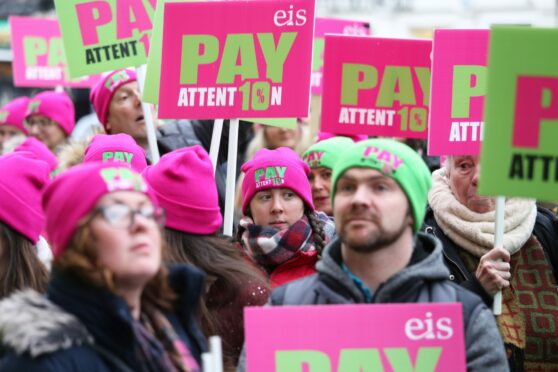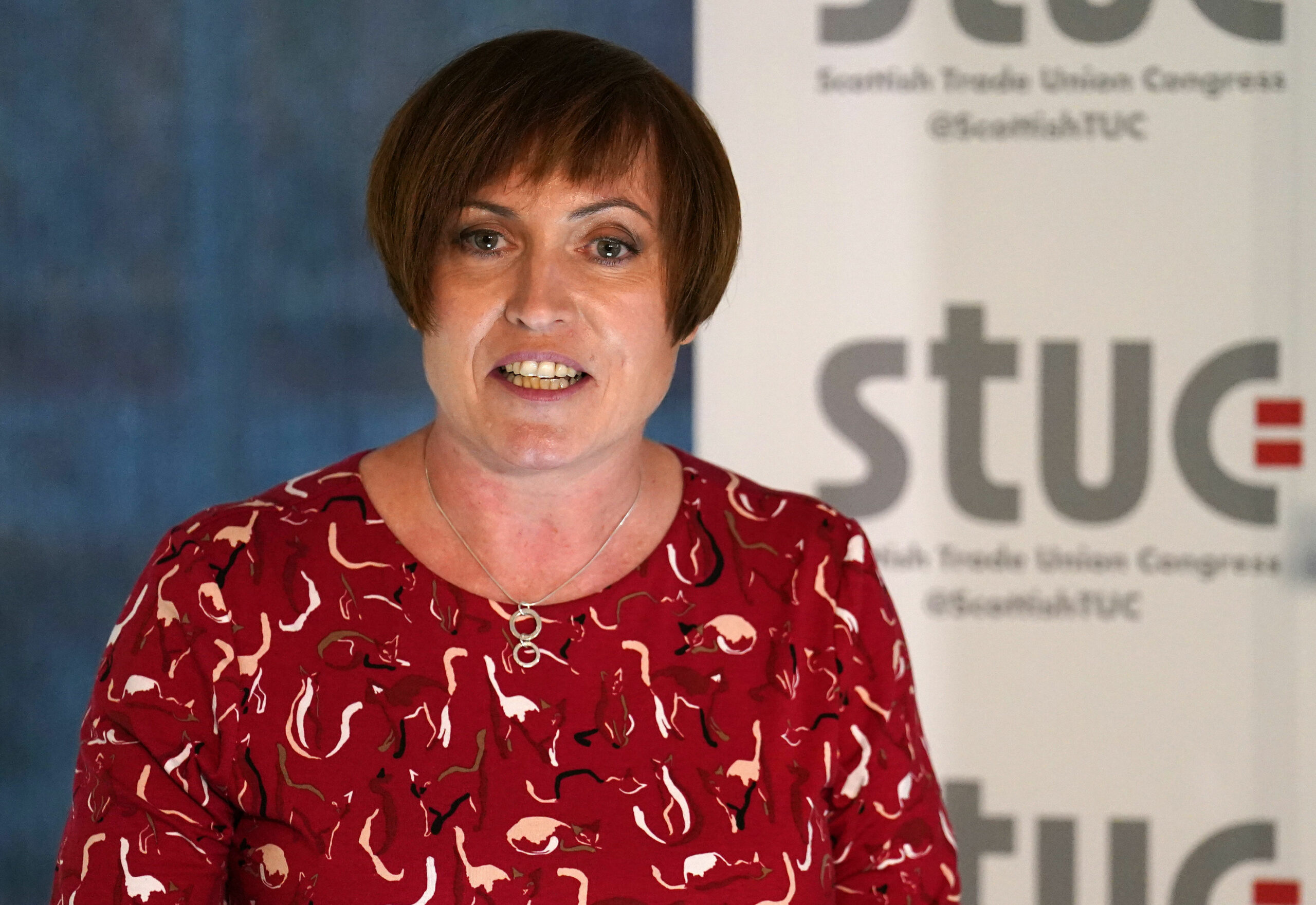
Unions warned Scotland faces a spring of discontent yesterday with NHS staff and firefighters among the workers considering joining the wave of strikes.
Ongoing industrial action by teachers, railway staff, and Border Force officers, is already expected to roll into 2023 if pay deals cannot be reached and the Scottish Trades Union Congress (STUC) yesterday said fresh disputes could see tens of thousands more workers taking industrial action in coming months.
General secretary Roz Foyer said: “Unless we see movement then widespread action seems likely to continue into the new year and spring.
“There are major unresolved disputes across our railways, Royal Mail, education and the civil service. Firefighters are also currently balloting for industrial action.
“The UK Government is blocking a resolution of the rail strikes and employers at Royal Mail and in higher education are digging in their heels. The Scottish Government also needs to come back to education unions with a meaningful offer. Unless we see some movement then widespread action seems likely to continue into the new year and spring.”
About 20,000 postal and railway staff alone are already striking in Scotland over the festive period. Further action by teachers is already planned for January and February.
The warning came as the UK Government yesterday said it has been training hundreds of military personnel and 1,000 civil servants to cover for Border Force workers to keep British airports open.
The CBI in Scotland voiced concern about the impact of the increasing numbers of disputes on its business members and the public. It said: “The expansion in strike action across numerous sectors is regrettable but unsurprising in a cost of living crisis. Many businesses are having to make difficult workforce decisions and need to strike a balance between fair pay settlements at a time of high inflation versus their capacity to run their day-to-day operations and invest for the future.
“At a time of such economic hardship for people and businesses throughout Scotland, the focus must be on the constructive dialogue needed to resolve these disputes.”
Teachers in Scotland were on strike in November after a new pay offer was rejected. More walk-outs are planned in the new year.
The industrial action by members of the Educational Institute of Scotland (EIS), which represents almost 55,000 teachers, led to the closure of schools and it came after the union’s demand for a 10% increase in pay was not met.
EIS members in primary schools will strike on January 10, while those in secondary schools will walk out the following day. Sixteen additional days of strikes in January and February have also been announced by the union, with teachers in two local authorities on strike on each of the 16 days.
EIS general secretary Andrea Bradley said: “After our initial day of national strike action last month, the EIS opted not to take strike action during December. We hoped that this would offer a period for further negotiation. Sadly, no improved pay offer has been forthcoming.”
Education Secretary Shirley-Anne Somerville insisted the Scottish Government remains committed to a fair, sustainable settlement for Scotland’s teachers.
While ScotRail staff accepted a pay rise of 7.5% for conductors and ticket examiners as well as an 8.5% rise for lower-paid employees, Network Rail staff across the UK are still on strike, impacting on services north of the border.
Train passengers faced disruption this weekend, with ScotRail running only 12 services in the central belt, Fife and the Borders. Network Rail has advised people not to travel on trains unless absolutely necessary.
Network Rail members of the RMT union plan a further four strike days in the first week of January. Andrew Haines, Network Rail chief executive, said yesterday the RMT had “deliberately chosen to try to ruin Christmas for millions of passengers and businesses”.
Postal workers have been striking across the UK this month over pay and Royal Mail modernisation plans. Most Post Offices will remain open but letters and parcels will not be delivered.
The Communications Workers Union (CWU) warned that, although current strike action was due to end on Christmas Eve, further industrial action was likely in 2023.
Scotland’s firefighters are also on the brink of walking out over pay and conditions. A ballot of frontline and control staff on potential strike action closes on January 30.
In the NHS, junior doctors in Scotland plan to ballot for strike action. Members of the GMB union who work for NHS Scotland, including 1,700 ambulance staff, rejected a pay offer by two-thirds after a consultative ballot. It means nearly 8,000 GMB members – including paramedics, technicians, nurses, porters, domestics, and radiographers – across eligible health boards could take industrial action.
GMB Scotland Secretary Louise Gilmour said: “More strikes are inevitable if governments remain intransigent to peoples’ struggles and the real-world consequences of their political mismanagement.”
In England, hospitals were yesterday urged by NHS bosses to free up beds to prepare for “extensive disruption” caused by ambulance staff strikes. Ambulance staff south of the Border are to walk out on December 21 and 28 – prompting the UK Government to plan to bring in 1,200 armed forces personnel to cover for striking staff – but Scottish staff are not involved in this action.
Highway workers who are members of the PCS union are also striking in England – with potential consequences for Scottish hauliers.
Scots planning a winter break abroad could also run into long delays and cancelled flights. Border Force staff announced strike action lasting until the end of this month and have walked out at several airports across the UK, including Glasgow, with more action expected in the new year.
Staff at Highlands and Islands airports are also striking tomorrow and Thursday. Barra, Benbecula and Sumburgh airports will be closed but others including Inverness and Dundee will remain open.
Business Secretary Grant Shapps yesterday defended the UK Government’s approach to the public-sector pay dispute as “fair and proper”. He said people would “all end up much worse off” if ministers awarded inflation-busting pay rises.

Enjoy the convenience of having The Sunday Post delivered as a digital ePaper straight to your smartphone, tablet or computer.
Subscribe for only £5.49 a month and enjoy all the benefits of the printed paper as a digital replica.
Subscribe © Andrew Milligan/PA Wire
© Andrew Milligan/PA Wire